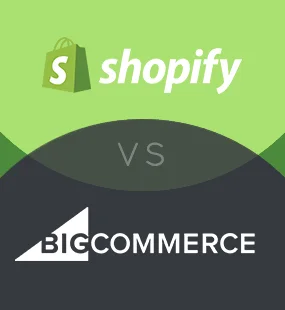- 16 August 2021
- Shopify Plus
- Reading time:4 min
Gartner’s 2019 view: Shopify vs Bigcommerce
Gartner’s view of the digital commerce market is focused on transformational technologies and approaches delivering on the future needs of sellers and their customers.
Gartner’s view of the digital commerce market is focused on transformational technologies and approaches delivering on the future needs of sellers and their customers.
Gartner has recognised Shopify as a Challenger in the 2019 Magic Quadrant for Digital Commerce. Shopify Plus is a multi-tenant SaaS commerce platform, which targets midsize enterprises or business units within large enterprises. Shopify also offers Shopify Payments, Shopify Shipping, Shopify POS and Shopify Capital to complement the commerce solution. Shopify recently acquired Handshake to expand its B2B capabilities.
Gartner recognised several strengths of Shopify:
Ease of use:
Shopify Plus offers no-code configuration of the store that can be managed by business users without involving the IT team. The average launch time is between three and four months. This is a key consideration for organisations whose commerce business is managed by business users.
TCO:
Shopify Plus has a highly competitive price that can be an order of magnitude lower than what other vendors in this Magic Quadrant charge. Its price is often negotiated, typically starting with a $2,000 monthly fee plus payment costs. Clients not using Shopify for payments typically find additional costs associated with each sale.
Multichannel support:
Shopify Plus offers native integration with over 20 channels, including marketplaces and social media such as Amazon, eBay, Facebook, Instagram and Pinterest. All these channels can be managed alongside the stand-alone commerce site from the single console. The vendor also offers a mobile SDK for native app development, and Shopify POS for in-store sales.
A couple of small concerns were listed for Shopify being that clients need to find a service provider [like acidgreen] to assist with integration, and they found the majority of service providers are in North America and Europe. Though with acidgreen being one of the largest shopify agencies in APAC this is not a concern for Australian retailers.
A major competitor of Shopify is BigCommerce. They are a Niche Player offering a multi-tenant SaaS platform for small-, mid- and large-size businesses. BigCommerce serves B2C and B2B, and continually upgrades its B2B functionality to better serve B2B clients. Most clients are generating digital commerce GMV below $20 million from the platform. Gartner recognised the strengths of Bigcommerce being that it offers unlimited API calls for mid- and large-size enterprise clients, and the technology flexibility with 90% of the platform exposed via API enabling it to compete with headless vendors. Gartner have concerns though with Bigcommerce B2B saying it "still lacks natively some of the more complex customer management functionality. It doesn’t natively support the ability for clients’ customers to set up or manage their departments and cost centers, or create workflow for approvals, budgeting or support/sub-user accounts. It also does not support clients’ abilities to manage their customers’ spending and available credit." Gartner have also said Bigcommerce B2C "may not support clients with more sophisticated use cases requiring more advanced functionality. Examples include subscriptions, tight POS integration and DOM without additional services or customization." acidgreen is a multi-award winning full service digital commerce agency. For more information regarding Shopify vs Bigcommerce please contact us.
Related articles


